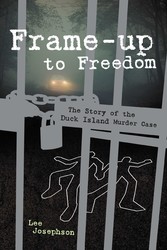
Frame-up to Freedom- the story of the Duck Island murder case
von: Lee Josephson
BookBaby, 2020
ISBN: 9781098327859
, 256 Seiten
Format: ePUB
Kopierschutz: DRM
Preis: 11,89 EUR
eBook anfordern 
Mehr zum Inhalt

Frame-up to Freedom- the story of the Duck Island murder case
In a stockade the Black private signed. By day private Clarence Hill was a hard working, never arrested, church-going father. But by night, by night Hill waited in the woods for lovers to park so he could murder the men and rape white women. In the America of 1944 the execution was certain, if the all-white jury could free itself from Hill's testimony of brutality and exhaustion in a stockade that led him to sign false confessions. A white jury soothed a troubled conscience by adding a recommendation of leniency in sentencing to a verdict of guilty of murder. And the Judge sentenced a confessed, Black serial killer to life with possible parole after 14 years. Frustrated by years of legal inactivity, Hill contacted Leon Josephson (the author's father), a Marxist attorney released from prison in 1949 after serving 9 months for contempt of the House of Representatives Committee on Un-American Activities To cope with prison life Hill lived off the hope, the hope brought by his 'new children,' the young Negroes of the civil rights movement unfolding beyond prison walls. Beginning in 1959, the parole board demanded Hill refrain from publicizing his story, that he was forced to sign the false confessions that forever closed the Duck Island murder case. By 1959 Josephson was Hill's attorney and only friend. 'Mr. Josephson, I won't let it stand, the story that a normal Negro like me is really a murdering monster out to get himself some white girls. Ready to be used on some poor Negro again when they got some more bit-time sex crimes and no white men to accuse. We must be cleared of what we was accused of long ago. These days, Mr. Josephson, we got freedom on the mind.'











